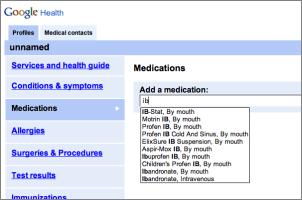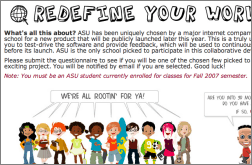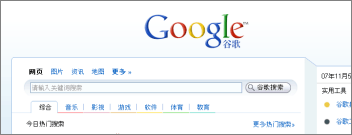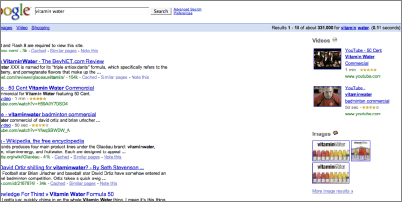Friday, December 28, 2007
Google in 2008
There’s no all-knowing glass bowl in reach for our predictions for Google in 2008, but in the meantime, we have some official announcements from Google Inc, outstanding rumored products, and a couple of visible trends. To recap, there’s...
... Google Health
Google Health was announced by Google’s Marissa Mayer for early 2008 (at least for the US, I suppose). Leaked screenshots of the program show the service aims to store information on your conditions, medications, allergies, surgeries, family health history and so on. With that extremely sensitive data in hand, Google’s computers may be able to help you and your doctor to put the puzzle pieces together. This way, via an automated health guide you may be informed about preventive measures, drug interactions or potential treatments, and your doctor may downsize their, to quote Marissa, “minutes per patient” to become more effective.
Practically every Google service which stores your information is a trade-off between privacy risks and the value you can get out of the service. Google Health may be no different, though (if it will be connected to your real name, e.g. to your Google Account) it may stretch the limit of what people deem acceptable to offer to Google’s great server farm.
... Maka Maka
On September 6, 2007, Google’s Ben Darnell gave an internal tutorial for new Google employees (the so-called “nooglers”). The video was filmed by another employee. So far, nothing unusual, except that later this confidential video surfaced on Google Video... perhaps uploaded there by accident.
Among coming changes to Google’s RSS Reader service, the video was foreshadowing a service called “Maka Maka.” This was supposed to be the new social back-end across different Google services, part of it being the roll-out of so-called “activity streams” in Google Reader. Already, a Google Profile service was released recently, and Reader introduced a feature showing your Google Talk friends’ shared items. It may be possible that this is just the beginning of the social Google back-end we’ll be seeing more of in 2008.
... Google My World
It’s hard to keep something in the vicinity of Google secret... even when you remove all Google brand features from the service. That was what Google did with their “MyWorld” program. All we know from the outside is that the sign-up screen to this program, which was tested at the Arizona State University, is showing some 2D and 3D avatars under the headline “Redefine Your World.” A globe is showing next to the headline.
... Niniane Wang’s “Project in Social Space”
This is becoming one of the oldest rumors around (search for google metaverse to get an idea), even though little to none is known about this project, except that it’s supposed to be in “social space” and product-managed by Niniane Wang (the Google employee who, according to Google, “learned the Lisp programming language at 10, and started college math classes at 11”). Who knows, it may even be the “My World” project outlined above.
What we do know though is that, at least according to Niniane Wang, this service or product can’t be completely boring, as Niniane presented the following mail from a colleague in 2006:
i realized today during the meeting that...
- if we’re working on the best project at google, and
- we’re working at the best company on the planet, then
we’re working on the Best Project in the World.
Niniane (caricatured) added, “Can’t argue with that logic.”
... Gdrive

If the Google Metaverse rumor above is one of the oldest, then the Gdrive rumor is probably the oldest. To clarify the name, Gdrive aka Platypus is a) an existing internal client for Google to share files (I got hold of the program before, though it requires an existing Google employee log-in to be useful), and b) a rumored project that may bring a unified file sharing back-end to users, and perhaps to Google’s services.
Right now, saving files and moving them from one Google (or other web app) to the next often still requires your “old-school” hard disk. Some of us however might prefer to have all their pictures, movies, music files and other data online... to be retrieved by clicking a special “browse” button from a web application. Maybe in 2008 this will become more mainstream?
One of the most recent times this rumor reared its head was when during a Google song contest, an employee sang “At least around here 5 years ain’t so long overdue”... and that part of the song was overlaid with the Gdrive/ Platypus icon. This video, incidentally, has now been removed. An older mention of Gdrive was left inside “hidden” comments in a PowerPoint file reading:
With infinite storage, we can house all user files, including: emails, web history, pictures, bookmarks, etc and make it accessible from anywhere (any device, any platform, etc). We already have efforts in this direction in terms of GDrive ...
... relaunch of Jotspot
Google acquired office web app and wiki software Jotspot in October 2006. Since then, Google has been working to integrate it into their offerings. It’s possible that in 2008, Jotspot’s wiki page editing software will become part of Google’s web apps, and perhaps replace Google Page Creator.
... Google Android
Google Android, the Google-led open mobile platform (“open” as in OpenSocial, the Open Content Alliance and so on... can you see a trend?), has already been released in early form, but for the general public to see it in action you have to resort to a software emulator. Maybe in 2008, some of us may get to play around with actual phone hardware show-casing the Android operating system? It may become tough to beat the (high-usability) iPhone, except that the iPhone right now is too expensive for many of us. If some Android-driven phones will be only ~90% as good but a lot cheaper, they may find themselves a happy niche. (The kind the Windows Mobile OS might occupy if it wouldn’t suck.)
... Knol
One of the most interesting recent Google announcements (“As a rule, we don’t preannounce new features.” -Eric Schmidt, 2002) was Google “Knol.” Currently in limited test mode, this mixture of About.com expert model and wiki functionality may become one of the failed Google attempts at growing communities, or a (smaller) competitor to Wikipedia.
2008 may not become the service’s success year, but – if the doors to this weirdly-named service are opened to the general public – it may become the defining year in terms of providing seed content for the site. A stable basis of articles may grow more good articles, whereas a site that seems to be abused by spammers from all sides may lead to more spam (“broken window phenomenon" style). You may argue the basis for user-generated content is karma, not money (I help Wikipedia because they don’t suck/ rip me off), and while Google has money, their karma is sometimes flaky.
... new China tools
China may be the market getting the most attention from Google next to their US home zone. In 2008, we might see even more locally optimized releases from the Google Beijing and Shanghai offices. In 2007 and before, expansion and research & development already spawned 1) a Google Input Method Editor to transliterate Pinyin/ Chinese, 2) partnerships with Tianya.cn which power social network Lai Ba and questions & answer site Wen Da*, 3) an experimental Google homepage, not the default live homepage and not officially linked yet, 4) more customized Google censorship than any other country is getting, to my knowledge, including “special” versions of Google Maps, Google Books, Google Image Search, Google News and Google web search.
*The Chinese “Lai ba” means “come here,” and “wen da” means “answering a question.”
... new Gmail design
Screenshots of a slightly changed Gmail layout have been circulating over at the Google Operating System blog. More to come in 2008?
... Google event oneboxes and logos
... like a Google logo doodle series for the Beijing Olympic games in August 2008, or a special Olympics results onebox/ Google News segment/ event news page/ gadget. Another logo doodle for the US in November 2008 may be urging people to vote*.
*Wonder if Google employees by and large are rooting for Barack Obama due to his tech-friendly message presented to them at their headquarters before?
... Google Gears
Google Gears is an installation which extends the browser to allow web applications to provide offline functionality. Such as Google Reader letting you download some posts to then continue reading them even when you’re offline (I suppose some of the younger ones among us will have to look up that word in the dictionary!). Right now, Google Gears – an open source project which Google may be hoping will gain traction in the overall market as it may be neat Trojan horse to bring more power to web apps (last not least Google’s web apps) – is still missing for such services as Gmail or Google Docs. Maybe in 2008, we’ll be seeing it rolled out to those as well?
... Google web result experiments
There’s the Google 80/20 rule (employees get 20% of their time for projects of their own choosing and liking... though perhaps it’s more like 100 + 20 for some employees). But there’s also the less known Google 70/20/10 rule, meaning that 70% of Google’s focus are search and advertisement. In 2007 and before the motto was “universal search,” meaning that web search results are intermingled with special boxes showing direct video, picture, blog, news results and so on. However, already a new prototype surfaced which moved these special “oneboxes” to the right-hand side of the results, where usually only ads appear. (As prototypes go, this one may or may not be rolled out as live feature.)
This onebox prototype points to what may become one of the key conflicts in search results in 2008; results integrity vs results cross-integration. Integrity as in: showing mostly neutral results, doing things in organic ways, separating ads from real results, and so on. And cross-integration as in: showing Google-favoring special results such as tips or “promotions,” showing Google Checkout buttons on some ads, showing YouTube results in different formatting, framing pages instead of directly linking to them and so on.
Sometimes cross-integration helps the user and Google; sometimes, it helps only Google at the expense of the user.
Google continues to argue that the user may leave with a single click, but that’s the thing with cross-integration; if you only like service A and B of theirs a lot, you will have a hard time switching from C to D if A and B tightly integrate C, but not D.
As a practical example, if you are a hard-core Gmail user but you find that Google Calendar sucks, you may still end up using Google Calendar over, say, Zoho Calendar, because Zoho isn’t integrated as nicely in the form of Gmail event invitations.
As another example, while you may theoretically prefer PayPal to Google Checkout for making online payments, if you find that Checkout is integrated much better into Google web search results – and you much prefer Google results – then you may end up becoming a Checkout user.
The end result of this phenomenon? Well, progress in all the sub-optimal Google products may stagnate even as that sub-optimal Google product is able to grow its user base anyway... the drawback of monopolies.
... iterative changes to almost every product, with all the fun and risks that brings
Google has a huge array of services, each with their own product teams. All products taken together means there’s a change almost every other week, and sometimes, every other day (or even every other hour in a day). That was true in 2007, it might continue to hold true in 2008.
There’s another noteworthy side-effect: every service hosted at *.google.com also has the power to add a security vulnerability that can impact the general Google Account, or parts thereof. And this may be the biggest risk for Google in 2008 and other years ahead: a big privacy/ security scandal. “Big” as in e.g.: “a hole exposed the emails of everyone.” (Imagine other people going through the emails of a celebrity, say, Larry Page.) This could shake the trust people have in the web apps model more than anything else; a giant win for every desktop application provider (like Microsoft) and a huge loss for every web apps provider (like Google).
On the other hand, if data risks don’t overshadow this new software model, then the growingly feature-rich web apps zone may get more and more new users in 2008. Google seems to be betting on this, if products like Google Docs (Google’s Excel/ PowerPoint/ Word light) are any indicator.
On a side-note, at the far opposite of change frequency are those Google products which seem to be halted. And some of them, we may even see being killed off in 2008. In the past it happened to such things as Google Answers, Google Onsite Advertiser Sign-up (Google: “We found that [it] was under-performing”), Google X, Google Related Links, the Google SOAP API, or the Google Health Advertising Blog (Google’s Karen Wickre last month: “we’re just not generating enough content here to warrant your time”).
... more employees leaving Google
Perhaps naturally Google has a lot of fluctuation: old employees leave the company and new ones arrive. Sometimes, the original company spirit survives, sometimes it is changed... for better or for worse. (I suppose survival of core values on company scale is especially likely if these core values aren’t being eroded by the company bosses themselves, i.e. self-proclaimed values are always strictly stuck to.)
Ever since Google went public in 2004, the company is at least partially split between those that started working there before, and those that arrived later – a two-class society, if you want, between the millionaires and the latecomers. But this divide may not be the only and perhaps not even the core source of employee frustrations; a bigger challenge may be for Google, now a giant machine of thousands of employees, to keep the spontaneous “start-up” creativity & excitement alive. The less they manage to do so, the more brilliant minds may leave.
Facing the choice between a low-impact role in a high-impact company versus a high-impact role in a low-impact company, some developers and designers may prefer the latter... because while there’s added risk, there’s also added potential for explosive growth. With all the money being poured into Silicon Valley, California, it may also seem like good timing for some to leave now before a bubble bursts (though if it does burst in 2008, it may kill some of the seemingly more exciting start-ups with it, and Google may become the much better choice again; after all, while a bubble bursting may kill some of Google’s side products, it’s hard to imagine it will kill all of them).
As a side-effect, with more employees leaving the company, more stories from within the closed Google walls may emerge as well. In 2007, many chapters of the Google story are long past yet unwritten. Non-disclosure agreements blur an important part of technology history, but when an employee stops working for the company, it’s more likely they will share their stories in the form of biographical books, email interviews, television appearances and so on. We may hear more and more about trivialities (such as Google employees losing a bet to then run around in bathing suites to take a dip in the freezing cold water of Lake Tahoe), but perhaps we’ll also find out more substantial things about how products like Gmail, Google Maps, Google Translator, Google Gears, Orkut, China censorship, Google web search, as well as the giant server farm powering it all, came about. Pixels end up looking very clean on screen but there’s a lot of human messiness involved before they reach their final destination.
What do you think we’ll see from Google in 2008?
[MyWorld screenshot by It5five.]
>> More posts
Advertisement
This site unofficially covers Google™ and more with some rights reserved. Join our forum!





